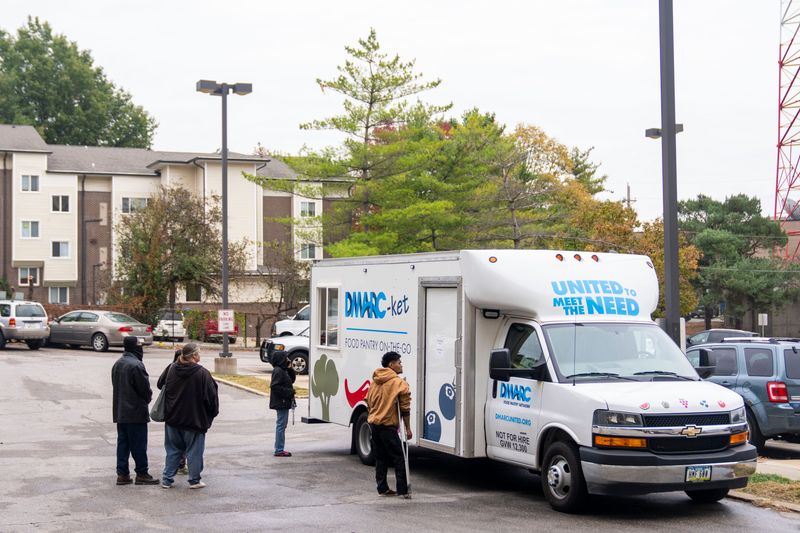The last few days have been tough on Jill Bensley.
The 59-year-old Des Moines resident who relies on food assistance benefits was crushed by the weight of the news that she and hundreds of thousands of Iowans may go without money from the Supplemental Nutrition Assistance Program starting Nov. 1 as the government shutdown continues. Bensley, who has disabilities and uses a wheelchair, said she and her friends depend on SNAP each month are anxious about the weeks ahead.

“I have friends come over in the middle of the night … They woke me up worried,” Bensley said. She was among several residents at Royal View Manor on Tuesday, Oct. 28, waiting outside her apartment complex in the rain to receive items from a Des Moines Area Religious Council (DMARC) mobile food pantry.
Bensley, who has peripheral neuropathy, nerve damage that has affects her legs and feet, uses SNAP dollars and items from the pantry that stops at her Des Moines apartment complex to piece together meals. Bensley said she also receives money through a program administered by her insurance company, but those dollars shoulder her rent, utilities, prescriptions and other living expenses.
Asked how she plans to navigate the next few weeks, Bensley shook her head. She does not know. But she has confidence she will figure it out.
“I’m going to make it,” she said, pausing. “And when you have that, you’re going to make it.”
The government shutdown will reach its one-month mark at the end of October. A U.S. Senate vote Oct. 28 failed — for the 13th time — to find a solution as Americans endure what is already the second-longest shutdown in history.
SNAP benefits, also known as food stamps, help low-income residents afford food by providing pre-loaded debit cards participants can use at grocery stores and other retailers. Money is loaded on the first of the month.
SNAP is entirely federally funded even though states determine eligibility and split the costs of administering the program with the federal government.
“Because SNAP is fully funded and operated by the federal government, states are unable to step in and keep it running,” Iowa Gov. Kim Reynolds said Oct. 26. The U.S. Department of Agriculture issued a memo saying “there is no provision or allowance under current law for states to cover the cost of benefits and be reimbursed.”
More than 42 million people across 22 million households in the U.S. relied on SNAP benefits every month during fiscal cycle 2025, according to the USDA. In May, more than 267,000 Iowans received $45.5 million worth of SNAP benefits, the department reported.
A memo on the USDA website blames Senate Democrats for not funding SNAP as they continue to vote against a budget resolution until Republicans agree to extend health care subsidies.
“Bottom line, the well has run dry,” it reads on the front web page.
Iowa food bank leaders have warned that they face an “unprecedented” challenge if the federal government fails to provide SNAP money for the first time in the program’s history. They believe Iowans who rely on SNAP benefits may lean harder on local pantries, which already are serving record numbers of clients.
“It’s never happened,” said Andrea Cook, executive director of the Johnston Partnership, a food pantry under DMARC. “Sixty-eight-plus years of food stamps and SNAP in this country, and there hasn’t been a one-day delay in benefits being issued.”
Cook said she and staff already have seen a steady rise in the number of visitors in the last two years as COVID-19 pandemic relief programs ended. The cost of living has gone up, making it difficult for people to make ends meet, she said.
Johnston Partnership sees 2,500 to 3,000 individuals a month. Many are working, trying to balance multiple jobs and are between the ages of 18 and 59 years old. Clients who may have used pantries on occasion are becoming regulars.
What they earn is “just not enough to be able to survive — (to) pay for basic living,” Cook said.
As the days inch toward Nov. 1, Cook and many other food system leaders are bracing for the unexpected.
“Right now, there is a lot of confusion and uncertainty for SNAP recipients,” said Lisa Spitler, who helps connect clients at the River Bend Food Bank in Davenport to food assistance programs. “It is overwhelming to pantries to keep up with increased demand, and it is hard on local economies because the loss of SNAP means the loss of money going into the local area.”
Cook said she, staff and a team of volunteers feel the pressure of trying to plan for the unexpected.
“We never know if there’s going to be a day where everybody comes,” she said. “We’re in this kind of world right now, trying to plan for what happens if everybody who has come needing food from us over the course of the year comes in the same month.”
Cook is trying to stay optimistic.
“I try to be a glass half-full kind of person, but I am wondering if we’re going to find out what the limitations are to the charitable food and security network in the community,” she said. “I feel like we’re going to get to January, and we may be surprised to find that there could be some organizations that are not able to keep up.
“They can’t do it anymore — that they are closing for more days than they are open or whatever it may be, just because we’re trying to figure out how to make it work the best way we can. It’s a lot.”
People at Food Bank of Iowa, the largest of Feeding America’s six food banks in Iowa, are grappling with the same anxiety. Food banks do not receive federal funding, have limited resources and depend on volunteers and donations, said Annette Hacker, spokesperson for the Food Bank of Iowa, which serves 55 of the state’s 99 counties.
“We and our 700 frontline partners are all working very hard, but it isn’t possible for the charitable food system to fill the immense gap created by lack of SNAP benefits,” Hacker said in an email. “For every one meal we provide, SNAP provides nine.”
In the lobby of Royal View Manor, Bensley moved the two small grocery bags she received from the mobile pantry from her lap to a bench. She fears the day when pantries may no longer be an option.
“We’re lucky we got this,” Bensley said, opening up one of the bags to show a pound of ground meat, oatmeal, pasta and some canned goods.
“It’s a little bit here and there,” she said.
Reporter Stephen Gruber-Miller and USA Today contributed to this story.
F. Amanda Tugade covers community and faith for the Des Moines Register. Email her at ftugade@dmreg.com or follow her on X @writefelissa.
This article originally appeared on Des Moines Register: With no SNAP benefits in November, Iowans, pantries brace for food shortages
Reporting by F. Amanda Tugade, Des Moines Register / Des Moines Register
USA TODAY Network via Reuters Connect





